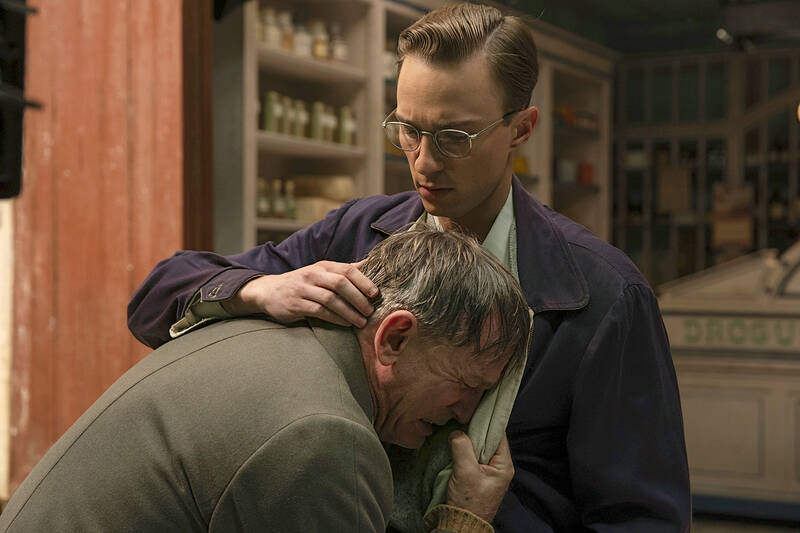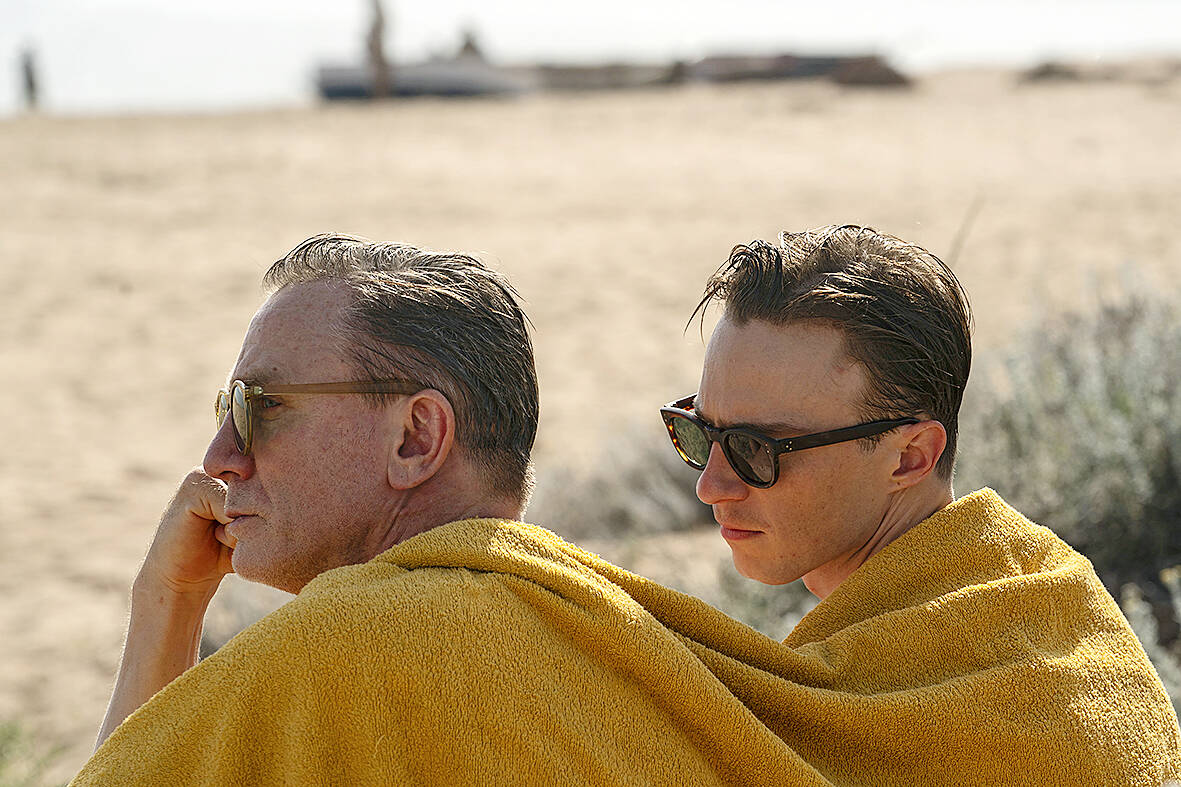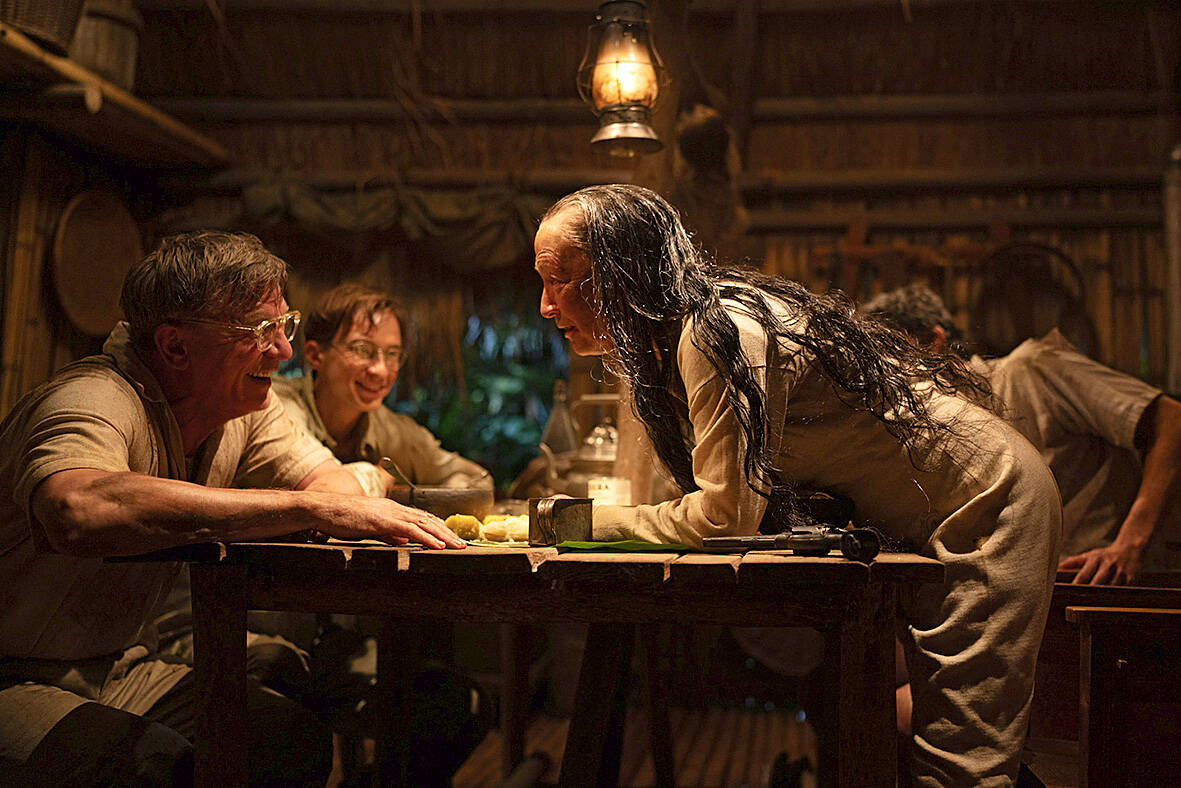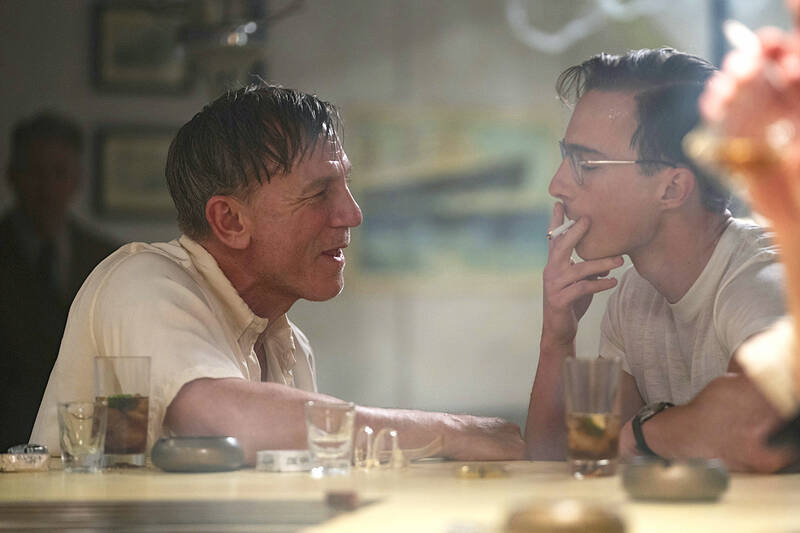One of the first real signs that Queer is going to be an unconventional movie is when Daniel Craig in a linen suit saunters through Mexico City during the early ‘50s and the soundtrack blasts a song by Nirvana.
It’s a pretty nifty way to explain this story of a man unmoored by time, geography and himself. Craig plays William Lee, an American hiding out in Mexico who spends his time going from bar to bar, knocking back tequila or mescal.
Why is he hiding out? For one thing, he’s a junkie and Mexico is more permissive about heroin use than the States at this time. He’s also gay when being gay was abhorrent and Mexico was, again, more permissive. Lee is part of a wealthy expat contingent that fritters away the days stewed in liquor and gossip.

Photo: AP
He doesn’t just sound like a William S. Burroughs hero, he’s partly Burroughs himself — Queer was a confessional novella written long before his breakthrough novel Naked Lunch. So buckle up. You’re going to see some weird stuff.
Queer is best when it’s a character study of Lee, who in Craig’s hands is charming, selfish, arrogant, abrasive, foppish and sometimes unable to read a room. It’s a million miles from 007, even if Lee carries a pistol. Craig allows us to see the yearning for real love that Lee numbs with shot glasses and needles. That Nirvana song is Come as You Are.
One day that real love suddenly appears in the form of the younger Eugene Allerton (a superb, icy Drew Starkey), who unlocks something in Lee. Could Eugene be the one to make Lee whole? Could they ride off into the sunset? Don’t be silly. This is a Burroughs story.

Photo: AP
Eugene is on-again, off-again, sometimes loving Lee and sometimes preferring a woman’s company. Part of Eugene seems to dislike Lee or being seen with him. Lee’s voracious need — shown with vigorous lovemaking scenes — is overpowering.
One scene has the two men walking down a street and Eugene subtly shakes off the older man’s hand on his shoulder. “Is he a queer?” Lee asks a friend. “I can’t tell.” One drunken night he approaches his source of adoration and confesses he wants to speak without speaking. He soon will try.
Director Luca Guadagnino and screenwriter Justin Kuritzkes, who teamed up for Challengers, face enormous challenges in adapting Burroughs’s words to the screen and yet they manage it, lyrically.

Photo: AP
There is a single-take scene in which Lee assembles the equipment necessary to inject himself with heroin and the camera watches as he gets high, slowing his body down to become a sort of pathetic statue at the kitchen table.
Symbols — a wriggling bug, snakes and mirrors — combine with trippy techniques meant to show Lee’s interior life, like his arm superimposed onto a scene tenderly touching his paramour when, in reality, it is hanging still. And there is a late moment of surreal beauty as the lovers climb into each other’s bodies, hands under the skin.
Queer — broken up into three chapters and an epilogue — gets trippier in the later stages, when Lee and Eugene leave Mexico in search of a South American plant that apparently gives users telepathic powers. Lee is clearly trying to find a shortcut into the soul, bypassing the messiness of human interactions.

Photo: AP
“You think it can fix things for you,” he is told.
But this part isn’t well integrated with the first half, almost like a movie fragment, and the filmmakers fumble an attempt to deal with the death of Burroughs’ wife, Joan Vollmer. Guadagnino seems to unnecessarily channel Stanley Kubrick as the movie wobbles to its end, with scenes filled with deafening sound, then pregnant silence and an artificial momentousness.
The score by Trent Reznor and Atticus Ross is vibrant but it gets a chef’s kiss with the addition of songs by Prince, New Order and Lydia Mendoza, mixed with contemporary songs by Benny Goodman, Eddie Cantor, Frankie Lane and Cole Porter.
The weight of it all comes down to Craig, and he’s a wonder in a fedora, dirt stains on his linen pants. Queer is a reminder of how good an actor he is and how brave he can be — naked, needy and noxious. You’ll be shaken and stirred.

Dissident artist Ai Weiwei’s (艾未未) famous return to the People’s Republic of China (PRC) has been overshadowed by the astonishing news of the latest arrests of senior military figures for “corruption,” but it is an interesting piece of news in its own right, though more for what Ai does not understand than for what he does. Ai simply lacks the reflective understanding that the loneliness and isolation he imagines are “European” are simply the joys of life as an expat. That goes both ways: “I love Taiwan!” say many still wet-behind-the-ears expats here, not realizing what they love is being an

Google unveiled an artificial intelligence tool Wednesday that its scientists said would help unravel the mysteries of the human genome — and could one day lead to new treatments for diseases. The deep learning model AlphaGenome was hailed by outside researchers as a “breakthrough” that would let scientists study and even simulate the roots of difficult-to-treat genetic diseases. While the first complete map of the human genome in 2003 “gave us the book of life, reading it remained a challenge,” Pushmeet Kohli, vice president of research at Google DeepMind, told journalists. “We have the text,” he said, which is a sequence of

Every now and then, even hardcore hikers like to sleep in, leave the heavy gear at home and just enjoy a relaxed half-day stroll in the mountains: no cold, no steep uphills, no pressure to walk a certain distance in a day. In the winter, the mild climate and lower elevations of the forests in Taiwan’s far south offer a number of easy escapes like this. A prime example is the river above Mudan Reservoir (牡丹水庫): with shallow water, gentle current, abundant wildlife and a complete lack of tourists, this walk is accessible to nearly everyone but still feels quite remote.

It’s a bold filmmaking choice to have a countdown clock on the screen for most of your movie. In the best-case scenario for a movie like Mercy, in which a Los Angeles detective has to prove his innocence to an artificial intelligence judge within said time limit, it heightens the tension. Who hasn’t gotten sweaty palms in, say, a Mission: Impossible movie when the bomb is ticking down and Tom Cruise still hasn’t cleared the building? Why not just extend it for the duration? Perhaps in a better movie it might have worked. Sadly in Mercy, it’s an ever-present reminder of just